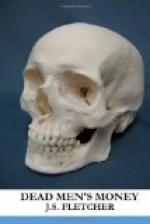“I saw nobody and heard nothing—about here,” said I. “It’s not likely there’d be strangers in this spot at midnight.”
“For that matter, the poor fellow is a stranger himself,” said he, once more turning his lamp on the dead face. “Anyway, he’s not known to me, and I’ve been in these parts twenty years. And altogether it’s a fine mystery you’ve hit on, Mr. Hugh, and there’ll be strange doings before we’re at the bottom of it, I’m thinking.”
That there was mystery in this affair was surer than ever when, having got the man to the nearest inn, and brought more help, including a doctor, they began to examine him and his clothing. And now that I saw him in a stronger light, I found that he was a strongly built, well-made man of about Mr. Gilverthwaite’s age—say, just over sixty years or so,—dressed in a gentlemanlike fashion, and wearing good boots and linen and a tweed suit of the sort affected by tourists. There was a good deal of money in his pockets—bank-notes, gold, and silver—and an expensive watch and chain, and other such things that a gentleman would carry; and it seemed very evident that robbery had not been the motive of the murderers. But of papers that could identify the man there was nothing—in the shape of paper or its like there was not one scrap in all the clothing, except the return half of a railway ticket between Peebles and Coldstream, and a bit of a torn bill-head giving the name and address of a tradesman in Dundee.
“There’s something to go on, anyway,” remarked Chisholm, as he carefully put these things aside after pointing out to us that the ticket was dated on what was now the previous day (for it was already well past midnight, and the time was creeping on to morning), and that the dead man must accordingly have come to Coldstream not many hours before his death; “and we’ll likely find something about him from either Dundee or Peebles. But I’m inclined to think, Mr. Hugh,” he continued, drawing me aside, “that even though they didn’t rob the man of his money and valuables, they took something else from him that may have been of much more value than either.”
“What?” I asked.
“Papers!” said he. “Look at the general appearance of the man! He’s no common or ordinary sort. Is it likely, now, such a man would be without letters and that sort of thing in his pockets? Like as not he’d carry his pocket-book, and it may have been this pocket-book with what was in it they were after, and not troubling about his purse at all.”
“They made sure of him, anyway,” said I, and went out of the room where they had laid the body, not caring to stay longer. For I had heard what the doctor said—that the man had been killed on the spot by a single blow from a knife or dagger which had been thrust into his heart from behind with tremendous force, and the thought of it was sickening me. “What are you going to do now?” I asked of Chisholm, who had followed me. “And do you want me any more, sergeant?—for, if not, I’m anxious to get back to Berwick.”




